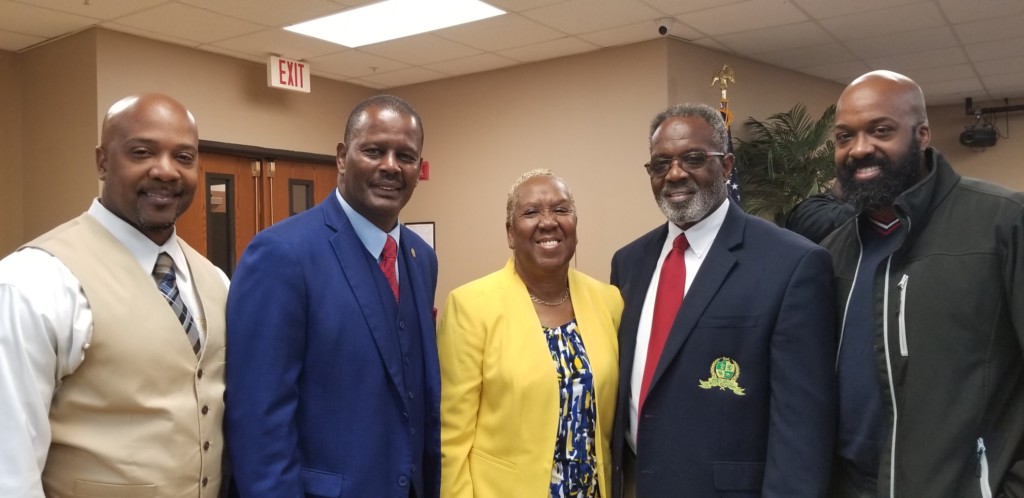
Editor’s note: redefinED wraps up its series of podcast flashbacks with one of the best from 2019: an interview with state Rep. James Bush III.
OPA-LOCKA, Fla. – If you want to know why Florida state Rep. James Bush III supports educational choice, take a ride with him.
Just a few blocks from his legislative office, District 109 – which Bush called “one of the largest and poorest and most violent and neglected districts in the state” – is more Mad Max than Miami, a hodge-podge of industrial zoning and bars-over-windows residential. On a recent Sunday, Bush bumped a rented Mustang down a moonscape of graded road, lined with teetering chain-link fence and littered with cast-offs: a flat-screen TV, a jet ski, a crushed camper top.
Around the corner, a line of salvage yards emerged like fortresses, stacks of crunched cars rising over walls topped with barbed wire.
Then, right next to them, a public housing complex …
Bush braked. The contrast panned into view. Satellite dishes poking out of lavender stucco … a woman pushing a stroller … kids riding bikes …
“Now what is right five steps from this (junk yard)?” Bush said. “Look at all this stuff the kids are breathing. I don’t want it to sound like I’m painting a real negative picture of our city but … this should be our focus.”
“Those are the kinds of concerns I have when it comes down to doing what I’m supposed to be doing as a rep in Tallahassee,” he said minutes later. “Not getting caught up in who can control who, and doing the most politically correct things, and not putting the children of this state first … ”
Say hi to Florida’s newest school choice Democrat.
Bush, 63, served four terms as state representative in the 1990s. He was elected for a term in 2008. He was elected again in August.
His Democratic roots run deep. Bush retired after 30 years as a public school teacher (and teachers union member). He served as acting president of the Southern Christian Leadership Conference. He earned his bachelor’s from Bethune-Cookman, the private-school-turned-college founded by Mary McLeod Bethune. Bush doesn’t just know the history of black churches, education and liberation. He’s lived it.
His support for choice is, on the one hand, practical. His district includes thriving faith-based schools. His district has far more pressing needs than what schools parents choose. As a lawmaker, he said he’s going to fight for more funding for the Miami-Dade school district (and everything else his district desperately needs) at the same time he supports the options his constituents desperately want.
On the other hand, Bush’s support is grounded in a belief. When parents are empowered to determine the educational destinies of their children, he said, that confidence in the power to make change spills over into the rest of their lives.
“Because the parent now would say, ‘Well I feel now better because I got my child where I think it’s best for them,’ as opposed to going through just a normal traditional way of educating,” Bush said. “It gives them a sense of belonging and a sense of ownership and a sense of having some input.”
“It propels them to another level of getting involved in other things that affect their child,” he continued. “It’s a plus in the long run.”
HD 109 is 20 minutes, but a world away, from the condo towers gleaming along Biscayne Bay. It’s split between blacks and Hispanics. It’s shaped like a gun.
Liberty City sits where the grip is. The neighborhood of Brownsville, once dubbed Miami’s most blighted, is where the barrel begins. The city of Opa-Locka is where the sight would be. By some measures, it’s one of the most dangerous cities in America.
As night fell, Bush turned towards Ali Baba Avenue, once a notorious drug hole. He stopped between a zippy mart with a Lotto sign and a tiny apartment complex with plywood-covered windows. A woman emerged from the shadows, a man on a plastic sheet – asleep? – on the ground behind her.
“My friend,” Bush said through the car window. “This Bush.”
“Hey!” the woman chirped. “How are you sweetie?”
The two clasped hands. Turns out, the woman worked on Bush’s campaign. He thanked her for the help, then asked about the man on the ground. She assured him the man was okay.
HD 109 is full of good people doing good things, Bush said over and over. But that guy on the ground?
“I got spots,” he said, “where a lot of that takes place.”
Bush riffed on his district’s challenges. Better roads, better jobs, better housing … safer, cleaner neighborhoods “so our children can have a different perspective on life.” He kept repeating: The people in HD 109 “have a lot of needs … need assistance … just need our share … ”
Same with schools. The Miami-Dade district is on the rise, arguably one of the best urban districts in America. At the same time, half its low-income students aren’t reading at grade level.
Given its depth of poverty, Bush said it’s no surprise HD 109 has among the highest concentrations of school choice scholarship students in the state. Some 2,330 use the Florida Tax Credit Scholarship, for lower-income students, to attend 28 private schools. Bush said the students in his district “benefit immensely from … not only the public schools but schools of choice.”
He said he supports them. All of them.
It remains to be seen how many other elected Democrats do.


